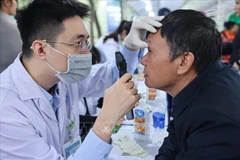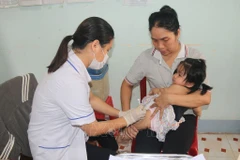Hanoi (VNA) - The Department of Preventive Medicine under the Ministry of Health said on January 5 that it is closely monitoring the situation regarding the new outbreak of virus-induced pneumonia in humans in China.
In a press release, the department said it will update and proactively provide and share accurate, comprehensive information.
Earlier, on December 16, 2024, the Department of Preventive Medicine issued Official Dispatch No. 1432/DP-DT to provincial and municipal health departments to proactively combat infectious diseases during the winter-spring season.
According to the department, on January 2, 2025, several foreign online platforms reported an outbreak in China with numerous cases of pneumonia caused by a virus (Human Metapneumovirus – HMPV). The reports indicated that the disease spreads quickly, showing symptoms similar to influenza and COVID-19, raising concerns about another potential health crisis after COVID-19, which also became a global issue in largely the same time period back in 2020.
In addition, images of overcrowded hospitals in China due to viral infections and reports of emergency declarations and overwhelmed crematoriums were shared on social media platforms.
Upon receiving this information, the Department of Preventive Medicine contacted the World Health Organisation (WHO) (in Vietnam and the Asia-Pacific region) and the International Health Regulations (IHR)'s focal point in China, which is the Chinese Centre for Disease Control and Prevention (Chinese CDC).
As of now, the WHO has not provided official information regarding the outbreak in China, nor has it verified the credibility and legitimacy of the news circulated on media and social networks.
The Department of Preventive Medicine stated that it would continue closely monitoring the outbreak caused by the virus in China, collaborate closely with the WHO and the IHR focal point in China to update information, and proactively provide accurate, comprehensive information, preventing unnecessary panic while ensuring vigilance and caution during the current winter-spring period, which is conducive to the spread of respiratory pathogens.
According to surveillance results from the 52nd week of 2024, reported by the Chinese CDC, specimens collected from outpatient and emergency departments revealed primary causative agents, including influenza viruses, human metapneumovirus (HMPV), and rhinovirus. For specimens from severe acute respiratory infection cases requiring hospitalisations, the primary agents identified were influenza viruses, Mycoplasma pneumoniae, and HMPV.
Currently, China is in winter, the usual time for respiratory infections to increase. The main pathogens include seasonal influenza viruses, respiratory syncytial virus (RSV) in children, and HMPV.
According to the same surveillance report, the number of respiratory infection cases with flu-like symptoms is lower than during the same period last year.
On January 4, 2025, the Chinese Ministry of Foreign Affairs stated that the ongoing respiratory infections in the country are typical and not an unusual public health event. Respiratory infections often peak during this time of year in China./.



























